
Published: January 25, 2019
What is a CNP?
A Certified Nurse Practitioner (CNP) is a registered nurse who has advanced education and training in a particular area, such as pediatrics or family practice. The educational background of a CNP includes a Master’s of Science in Nursing (MSN) graduate degree, as well as board certification in their specialty. Currently, in the state of Ohio, CNPs work collaboratively with a physician.
So, what can a CNP do? They can:
- Treat chronic conditions (diabetes, hypertension, asthma, COPD)
- Treat acute illnesses (flu, cold)
- Counsel and educate
- Diagnose conditions
- Write prescriptions for particular medications, including the frequency and dosage
- Diagnose and treat acute infections, injuries, and illnesses
- Order diagnostic tests, such as x-rays and electrocardiograms (EKGs)
- Record and examine your medical history, diagnoses, and symptoms
- Talk to you about effectively managing your health, as well as assisting in designing appropriate treatment plans and recommending further care
- Provide care and guidance when it comes to taking medication, as well as what side effects they may have, and any interactions that may take place with medications that you are already taking
By helping to promote healthy living, preventing disease and generally improving the health of others, CNPs are often referred to by the American Academy of Nurse Practitioners as ‘partners in health.’